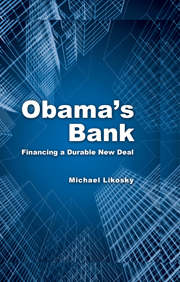4 - Leverage
Published online by Cambridge University Press: 05 June 2012
Summary
In Janesville, Obama said that his infrastructure bank would take a government commitment of sixty billion dollars over ten years and turn it “into almost half a trillion dollars of additional infrastructure spending.” This multiplying investment will produce “nearly two million new jobs.” For those who complained that the initial stimulus package undercapitalized infrastructure, these figures in the pipeline might be reassuring. Along these lines, Secretary of Transportation Ray LaHood related a core benefit of the Obama Bank: “Some of us that have been thinking about it believe you can raise a pretty good chunk of money.” At the same time, how does this mathematics work?
In October 1988, Governor Michael Dukakis of Massachusetts was running for president against Vice President George H. W. Bush. During the campaign, Dukakis introduced a partnership-based model that would supplant traditional Democratic Party economic policy. The Wall Street Journal explained the approach:
Mr. Dukakis's campaign hinges in large part on his ability to redefine liberal Democratic social policies so they become more affordable. Instead of giant federal social programs, the Massachusetts governor proposes government-led “partnerships” with the private sector and the states to provide such things as health care, housing and student loans – in short, leveraged liberalism.
This concept of leverage at the heart of partnerships is a cornerstone of today's proposed infrastructure policy. In fact, during the Dukakis campaign, the two terms were used interchangeably. Moreover, leveraged liberalism was defined at the time as “the use of government leverage to direct the energies of the private sector toward achieving public goals”; “government as the engine for creating services, rather than paying for them outright”; or, in the words of Dukakis's director of economic development, Alden Raine, “catalytic government.” Frank Keefe, his secretary of administration and financing, explained, “It's activism, but measured activism and, most of all, inexpensive activism.…We leverage by leading the way”; in other words, what is being called here “free market statism.”
- Type
- Chapter
- Information
- Obama's BankFinancing a Durable New Deal, pp. 47 - 64Publisher: Cambridge University PressPrint publication year: 2010



